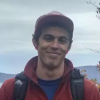news
EAS Graduate Students Win Fellowships to Take Their Research Outside Tech
Primary tabs
Four graduate students in the School of Earth and Atmospheric Sciences (EAS) were recently awarded fellowships that will broaden the scope of their research at Georgia Tech. From participating in research workshops to traveling across the globe, these students have gained the opportunity to extend their research impact beyond the Tech campus.
Jacob Buffo is one of two Ph.D. students to receive the NSF East Asia and Pacific Student Institute for U.S. Graduate Students (NSF EAPSI) Fellowship. The award enables Buffo to travel to New Zealand to work with the group of Natalie Robinson, a researcher at the National Institute of Water and Atmospheric Research. The team will be studying a phenomenon known as “platelet ice.” This is a layer of ice crystals and shards that forms at the interfaces of ice and oceans and strongly influences the properties and evolution of ice and its interaction with the water below.
Understanding the ice-ocean interaction is crucial in accurately simulating sea ice and ice shelves in global climate and ocean models, according to Buffo. Data gathered in research like this can also be used to understand ice that makes up the surfaces of planetary moons. Under the supervision of Britney Schmidt, an assistant professor at EAS, Buffo studies ice on the surfaces of Europa, a moon of Jupiter, and Enceladus, a moon of Saturn. Buffo has also just received a prestigious NASA Earth and Space Sciences Fellowship, which will support his Ph.D. studies for the next three years.
Buffo earned a B.S. in Astrophysics from the University of Iowa. He chose to pursue graduate studies at Tech “to be a part of an institute that values interdepartmental collaborative research,” he says. “It’s great to see scientists working together to tackle problems utilizing their different research backgrounds. When polymaths no longer exist and specialization is king, this is how science is meant to be done.”
Tiegan Hobbs, a Ph.D. student concentrating on geophysics, received the Natural Sciences and Engineering Research Council of Canada Postgraduate Doctoral Fellowship. The award allows her to travel to conferences and training events, as well as acquire new data from additional field work.
Her research aims to increase understanding of the processes occurring in the subduction zone of the Nicoya Peninsula, in Costa Rica. Subduction zones are places where tectonic plates collide, causing earthquakes and tsunamis. Hobbs uses cutting-edge methodology – developed by her supervisor, Andrew Newman, an associate professor at EAS – to study the behavior of those zones after a collision.
Hobbs has spent most of her educational training in Canada, receiving a B.S. in Earth and Planetary Sciences from McGill University, in Montreal, and a Master’s in Geophysics at the University of Victoria, in British Columbia. For her Ph.D. she came to Georgia Tech for “rigorous training in quantitative methods and opportunities to conduct field work,” she says. “Working with Dr. Newman has fulfilled those two objectives completely.”
George McDonald is studying for a Ph.D. focused on space and planetary science under the supervision of James J. Wray, an assistant professor in EAS. McDonald received the Kavli Summer Astrophysics Fellowship, which allows him to participate in a six-week workshop on exoplanet atmospheres in the University of California, Santa Cruz, beginning on June 20. Exoplanets are planets outside of our solar system.
McDonald’s research focuses on the remote sensing of volatile compounds in the lower atmospheres of Mars and Titan, the largest moon of Saturn. The workshop will train participants in modeling the atmospheres of exoplanets. The models will inform observatories scheduled to come online soon, including the James Webb Space Telescope, which is set to launch in 2018.
McDonald came to Tech after earning a B.S. Physics degree from Cornell University. He says it was the opportunity to collaborate with a “strong engineering program” that drew him to Tech, as well as an eagerness to help shape the relatively new planetary science program at EAS.
Amy Williamson, another Ph.D. student supervised by Andrew Newman, is the second student to receive the NSF EAPSI Fellowship. The award provides the means for Williamson to work with Phil Cummins, a professor at the Australian National University, in Canberra.
Williamson aims to better understand the sources of large, destructive earthquakes. “Because the phenomena that I study – earthquakes -- is a truly global hazard, it warrants a highly collaborative focus by many international research groups,” says Williamson.
Cummins and his colleagues in Australia have developed new ways to locate the source region of earthquakes. Williamson hopes to learn these techniques and apply them to her own research at Tech.
Williamson received a B.S. in Geosciences from Denison University, in Granville, Ohio. She came to Georgia Tech “for a focused approach to science and technology,” she says. And she hopes to take advantage of the many opportunities offered by the Institute.
“Congratulations to our Ph.D. students,” says College of Sciences Dean Paul M. Goldbart. “As a College, we are committed to expanding and enriching the research ecosystem for our students and faculty. We are confident that these successes early in your careers are harbingers of more to come after you receive your Ph.D. degrees from Georgia Tech.”
Scott Smith
Student Assistant, College of Sciences
Groups
Status
- Workflow status: Published
- Created by: Scotty Smith
- Created: 06/14/2016
- Modified By: Fletcher Moore
- Modified: 10/07/2016
Categories
Keywords
User Data




